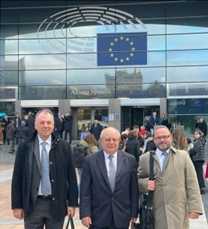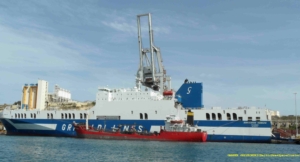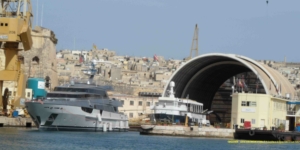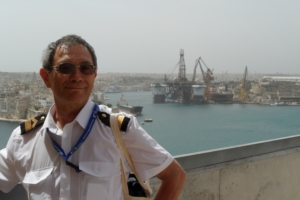Maritime alert in Brussels. Maritime clusters against decarbonization gaps



 By Marek Grzybowski
By Marek Grzybowski
The European Commission, fighting climate warming, gave birth to a “baby” in the form of ETS fees. It turned out that in this way she “threw the baby out with the bathwater” into the Mediterranean Sea. This month, the maritime shipping CO2 emissions trading scheme was the subject of intense discussions led by the Malta Maritime Forum (MMF).
In Brussels, during a series of meetings with European institutions, MMF representatives raised alarms about the negative effects of bypassing the regulations introduced by the European Commission. The expected disruptions in the maritime transport market were also discussed with industry associations, according to the Maritime Cluster from Malta.
During a recent visit to Brussels, the Director General of the Malta Maritime Cluster, Kevin J. Borg, discussed with the President of the European Parliament, Dr. Roberta Metsola, the risks arising from the implementation of the EU transport operator system for charging greenhouse gas emissions (ETS) in shipping to European Union ports.
Kevin J. Borg expressed the MMF’s concern about the serious business risks arising from fees for greenhouse gas emissions from ships’ smokestacks. Shipowners have taken actions and programs to escape the increasing costs of liner service operators resulting from the implementation of this European Commission directive and ETS fees. Many ship owners and charterers plan to simply pass these costs on to customers, as we wrote about here>>.
Escape from CO2 to Africa
ETS ships will need to purchase EU allowances (EUA) to cover half of their greenhouse gas (GHG) emissions to and from EU, Norway and Iceland (EEA) ports, as well as all emissions on intra-EEA voyages and when berthed at a berth in EEA ports.
The concerns of shipowners escaping from European ports are shared by other maritime clusters in the EU. In particular those operating in the Mediterranean region. Although the new regulations will probably also result in actions that will have negative consequences in the ports of the North Sea and the Baltic Sea. A significant part of the North Sea and Baltic ports may be at the end of feeder connections of African and Arab ports, as we wrote about here>>.
Due to the situation caused by the implementation of the EU directive, the Maritime Forum of Malta, like many of its partners, insisted on the temporary suspension of the implementation of the directive. The aim is to obtain time to properly assess the impact of the directive on the maritime transport market. Time is also needed to counteract such threats on an ex ante basis.
Costly ETS
The idea is “to ensure the successful achievement of the desired and laudable climate change targets, while ensuring continued and full solidarity between all EU actors and Member States,” emphasizes the Malta Maritime Forum.
Because so far we have realistic assessments from liner service operators who have announced that they will increase freight for containers delivered to EU ports. In 2024, the bill for EU ETS regulations will cost maritime transport operators with ships over PLN 500,000. GT approximately EUR 3 billion, as we wrote in GospodarkaMorska.pl.
During the visit to Brussels, the Malta Maritime Forum was represented by: Chairman, Godwin Xerri; Vice President, Alex Montebello; and CEO, Kevin J. Borg.
The aim of the FRP mission in Brussels was to present its statements and serious concerns regarding the threats that the implementation of the EU ETS directive poses to the Mediterranean EU Member States.


ETS fees will distort the market and competition
– The climate change-related goals of the Emissions Trading Scheme are laudable, but there is no doubt that they will not be achieved due to the escape of emissions and economic activity that the implementation of the directive will lead to – emphasizes Malta Maritime Forum. This will be the result of gross distortions resulting from competition [in maritime transport – Ministry of Economy] to the detriment of ports located on the southern periphery of the EU.
Based on the research and analysis of facts, MMF representatives showed that the ports of Marsaxlokk, Gioia Tauro, Pireaus and Algebieras are already losing ships and the ability to service them. Their operations are being taken over by new ports and terminals being expanded within existing competitive transport hubs in Egypt and Morocco. Shipping lines are redirecting their transshipment activities to these ports to avoid the new prohibitive costs of the ETS.
– Relocating operations to North Africa will not only deprive EU ports of the ability to operate, but will also increase – not reduce – carbon dioxide emissions in the Mediterranean Sea – warns the Malta Maritime Forum.
The risks associated with running a business and escaping CO2 emissions are now recognized and accepted by European institutions. At the same time, as we get closer to introducing fees, there are emerging signals that effective solutions to support decarbonization and the fight against warming need to be found in cooperation with the sectors and Member States concerned.
Governments have made recommendations
– The MMF continues to insist on the development of recommendations that are consistent with those formally submitted to the European Commission by the governments of Malta, Italy, Greece, Cyprus, Spain, Portugal and Croatia – says the Malta Maritime Forum.
During the last visit to Brussels, the Forum met with key people in the European Parliament and departments of the European Commission – DG Clima and DG Mare.
The MMF position was presented at a meeting with representatives of the European Network of Maritime Clusters (ENMC), of which the Baltic Maritime and Space Cluster is a member. MMF presented its assessment of the situation during talks with the management of the European Ship Owners Association (ECSA) and the European Sea Ports Organization (ESPO).
– Good job MMF. European citizens of countries bordering the Mediterranean Sea have a legitimate expectation that the Commission will take all necessary remedial action NOW, not later, by proposing alternative, equally effective solutions that will not result in discriminatory action against these countries and will discourage [operators – MG] ships to prevent the implementation of the entire noble purpose of the emissions trading system – wrote Ann (Bonnici) Fenech, Partner – Head of the Marine Litigation Dept Fenech & Fenech Advocates on a social networking site.
The European Commission “baby”
The introduction of fees for maritime shipping only within the European Union zone may have long-term negative effects on global supply chains to the EU and the European Economic Area. This was noticed by representatives of the Maritime Cluster from Malta and clusters operating within ENMC.
It is interesting that North Sea ports and operators operating on ocean routes react with such a delay. It may turn out that as a result of competition, operators of container ships, bulk carriers and tankers will not be able to increase freight rates. Then the ETS fees will be at their expense and will impact the deterioration of the profitability of shipping companies.
And we know that many operators have already suffered significant losses in 2023. The European Commission, fighting climate warming, gave birth to a “baby” in the form of CO2 emission fees. But it turns out that she “threw the baby out with the bathwater” into the Mediterranean Sea.
